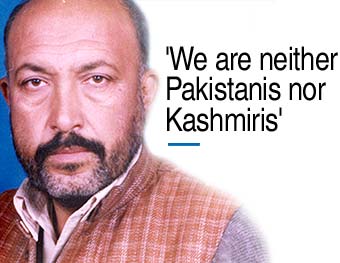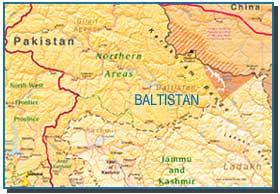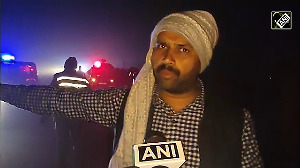
The northern part of what India calls Pakistan-occupied Kashmir and Pakistan calls its Northern Areas comprises the remote and backward areas of Gilgit and Baltistan. While what Pakistan calls Azad Kashmir comprises barely 4,000 square miles, the Northern Areas cover more than 28,000 square miles, though most of the area is too harsh for human habitation. Some 2,500 square miles of this region was ceded to China under a border agreement in 1963.
The people of this region, which comprises the districts of Gilgit, Skardu, Ghezer, Diamar and Ganchhe, however, prefer to call it Balawaristan, and many insist that they have been illegally occupied by Pakistan since November 16, 1947, when Pakistani troops and tribal volunteers invaded the then independent state of Jammu and Kashmir.
The Balawaristan National Front established on July 30, 1992, is currently headed by acting chairman Nawaz Khan Naji. In an exclusive interview with rediff.com Senior Editor Ramananda Sengupta, Naji explains why, despite being shot at by local policemen in June last year in an obvious assassination attempt, he still leads the movement for independence.
What made you take up the cause of independence?
I belong to Gilgit and am 41 years old. I am a graduate and have been a political activist since my student days. When I was a student, the people of Gilgit, of Baltistan, were crying to be annexed with Pakistan or with Kashmir. But I introduced a new ideology, that we are neither Pakistanis nor Kashmiris. That the people from Ladakh to Chitral have a separate identity, status, ideology, entity, that we have our own languages, culture, race, geography, and common economy, but we have never had a separate status. This area must first become a separate unit. Then we shall decide whether we want to go with Pakistan, with Kashmir, or seek independence.
For this purpose, I have established a political party, the Balawaristan National Front. Initially I was alone, but then I got many followers and was elected chairman.
What is Balawaristan?
I believe the Balti, Brooshoo (Yashkon), Sheen, Khoh (Chitrali) and Wakhi people and those Kashmiris, Gujjars, Kohistanis, Pathans, Turks and Hazaris who lived there before the Pakistani occupation belong to the same nation. We need a common name. This area is the junction of the Himalayas, Hindu Kush and Karakoram ranges in between the 'roof of the world' Tibet and Pamir. There are many high peaks, like Nanga Parbat, and the biggest glaciers of the world, like Siachen, here. In the past, the area was known as Bala, which means high. The people were called Balawar, or highlanders. That is why we call the area from Ladakh to Chitral Balawaristan.
This area was once part of Jammu and Kashmir. After Partition and the wars with India, it was occupied by Pakistan. But it is never described as Azad Kashmir, but as the Northern Areas by Islamabad, which rules it by proxy...
In the early 18th century, Balawar was divided into several states, which were attacked and occupied by Tibetans, by Chinese, and others. By 1850, there were three powers in the region -- Dogras, Sikhs and the British. They attacked first in Ladakh, then Baltistan, then Gilgit, and then Chitral, and occupied the area. From 1850 to 1947, the region was under Kashmiri rulers.
But the people of the region fought to expel the Dogras from Gilgit-Baltistan. They had a golden chance during Partition, when the maharaja [acceded] to India. At that time our people fought against the Kashmiris and established a free government, the Republic of Gilgit. The first president of Gilgit was Raja Sharif Khan.
After 15 days of rule, they asked for Pakistan's help -- not for annexation, because Kashmir had already been annexed by India -- and Pakistani officials came to Gilgit. But because they were weak, the Pakistanis occupied the area, expelled the president, appointed a political agent, and Gilgit became once again a political agency of Pakistan, like it was an agency of British India in the past.
But Pakistan had no chance legally to rule the area. Therefore they made an agreement with the Azad Kashmir government in 1949 that until the status of Kashmir is settled, the area would be ruled by the federal government in Islamabad. It is under this agreement that Islamabad rules the region.
But the Pakistani government is only a caretaker government till the decision on Kashmir. Once the Kashmir issue is settled, we will decide our future course, whether we want to go with Pakistan, with India, with an independent Kashmir, or become independent ourselves.
You mentioned Ladakh and Kargil as part of this region. What makes you think they will join you?
 I see Balawaristan comprising Gilgit-Baltistan, Chitral, Sheenaki, Kohistan, Ladakh and Kargil. But the inclusion of Chitral, Sheenaki, Kohistan and Ladakh and Kargil in Balawaristan depends totally and voluntarily on the will of their indigenous population. Once they see us as an independent nation which shares their cultural and other values, it will be up to them to decide.
I see Balawaristan comprising Gilgit-Baltistan, Chitral, Sheenaki, Kohistan, Ladakh and Kargil. But the inclusion of Chitral, Sheenaki, Kohistan and Ladakh and Kargil in Balawaristan depends totally and voluntarily on the will of their indigenous population. Once they see us as an independent nation which shares their cultural and other values, it will be up to them to decide.
The area is rich in natural resources and minerals, yet it remains so backward...
Founder of Pakistan Mohammad Ali Jinnah described Kashmir as the jugular vein of Pakistan. Actually this jugular vein is the Indus river, which flows through Ladakh, Baltistan and Gilgit. The second river is the Jhelum, which flows from the valley. The third is the Chenab which comes from Jammu. If this region separates from Pakistan, the jugular vein will be cut. The big jugular vein is Balawaristan, which has the most important river in Pakistan.
We have gold, minerals, fresh water from the glaciers, the power from the rivers. We are actually a buffer state of Asia. We are above Asia, centre of Asia, fulcrum of Asia, with borders with Pakistan, India, China, the Central Asian states and Afghanistan.
Gilgit is very important. The Pakistani government knows the importance of this area. So it doing a few things for the area in terms of development, but that is not enough. We are very important for Pakistan, but Pakistan is not giving enough attention to us.
Why?
Because we are a very backward region, far from Islamabad, there is a communication gap. Because, unlike the Kashmiris, we are not crying too much. We are not yet an independent nation. So someone who is not crying, who will give attention?
But now we are growing as a nation, because roads, telephonic communication, recently these networks are developing. Then we will connect to each other. And now we know about the world, what is parliament, what is president, prime minister, what is democracy, what is identity. Earlier, this was an island cut off from the world. The aeroplane first came to Gilgit, then the Jeep and other vehicles came. We are naturally backward. Therefore the Pakistan government was not giving us much attention. Now the Pakistan government is thinking seriously about the area, because the people are thinking about their basic and democratic rights. So now Islamabad has increased its budget for the region.
So who rules the region?
Pakistan's Kashmir affairs ministry is the ruler of Balawaristan. The Jammu and Kashmir minister is the chief executive of the area. He can make rules and regulations and administer the area. His orders are law. The area is sensitive militarily, so the military also has a say. But there is no participation of locals in the sense of elected representation. The chief secretary, the IGP, the home secretary, are all exported from Pakistan. A few secondary posts are held by their people who belong to Balawaristan.
What about allegations of human rights violations?
There are too many human rights problems. An area which is without a constitution, no independent judiciary, no democratic setup, these are all very big violations of human rights. The chief executive is not chosen by the people. Violation of human rights is not only to kill the people.
TOMORROW: 'We are ready to fight against Pakistan'





